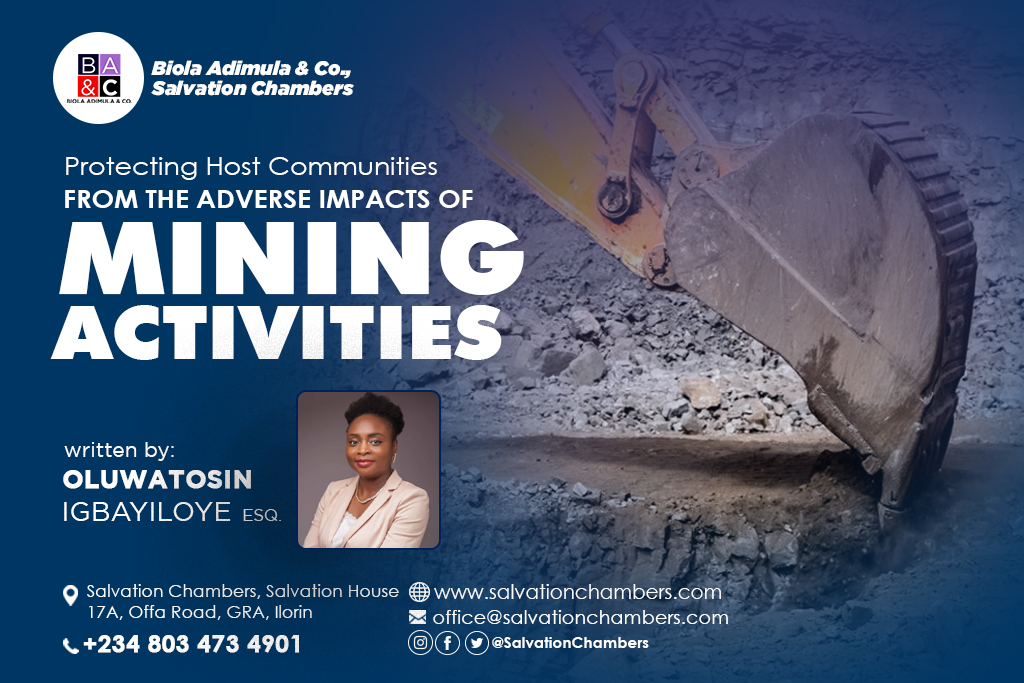Mining is currently one of the areas of diversification in the country. Nigeria is endowed with a variety of minerals which include 34 different types of minerals which are found in more than 500 locations of varying geological environments.
The mining sector of the economy became one of the areas of focus by the government because of its prospects for the economy and benefits for the population. While extraction of resources contribute to the growth of the economy, these activities have adverse impacts on the environment, community health, and result in social outcomes most of which are borne by mining host communities. Similar challenges host communities encounter includes environmental degradation, air and water pollution, conflicts, and loss of lives, livelihood, land, properties and cultural values.
These challenges are exacerbated by lack of awareness of mining laws and policies on the part of host communities, failure to comply with the laws on the part of mining companies and failure of government to regulate the industry effectively.
Relevant laws and their requirements
Key mining laws include the Nigerian Minerals and Mining Act No 20 of 2007 (NMMA), the Nigerian Minerals and Mining regulations 2011, Environmental Assessment Impact Act Cap E12 LFN 2004, and Land Use Act of 1978. The NMMA is the primary legislation that regulates the mining industry. The Act considers host communities affected by mining operations and a chapter of the Act addresses environmental issues and rights of host communities (Chapter 4 NMMA). The mineral resources in Nigeria are vested in the federal government and lands where mineral resources are found in commercial quantities are acquired by the government. In addition, the Governor of a state can revoke a right of occupancy for an overriding public interest that include mining purposes (Section 28 LUA). The Nigerian Mineral and Mining Regulations gives effect to the provisions of the NMMA while the EIA Act and the LUA Act governs the environment and land in Nigeria respectively. Some of the requirements under these regulations are;
- Responsible mining
The NMMA requires the holder of a mining lease to exercise the right conferred by the lease in a manner consistent with the reasonable and proper conduct of the operations concerned (Section 101(2) NMMA), carry out mining activities in a skillful, efficient and safe manner that comply with regulations on mining, health safety, social obligations and environmental impact analysis (EIA) requirements, and compensation to owner of land (Section 70(1) NMMA).
- Compensation and access to justice
A mineral title holder is required to pay reasonable compensation for disturbance to the land owner’s surface rights including damage to the land surface caused by mining (Section 107 (a); 110 NMMA, Regulation 162 Mining Regulation 2011), destruction and removal of crop, economic tree building or work to the owner (Sections 107 (b); 113 (1) & (2) NMMA). In addition, compensation is to be paid to the owner of land affected and the person who suffers damages in respect to pollution of water as a result of mining operations (Section 125). Furthermore, a party is entitled to submit questions on matters of damages, loss or disturbance suffered including amount of compensation payable for determination in the Federal High Court with jurisdiction in the area of occurrence (Section 113 (4) (b) NMMA).
- Environmental impact assessment
The Act requires an environmental impact assessment for exploration or mining operations approved by the Federal Ministry of Environment and an Environmental Protection and Rehabilitation Program. (Section 119 NMMA). The EIA is mandatory for all development projects in both private and public sectors in Nigeria with potential adverse impacts on the environment before execution. The procedures of EIA are further guided by the Environmental Impact Assessment Act.
- Consent and notification
The NMMA requires that the consent of the land owner or occupier must be obtained before licence can be granted otherwise the licence can be granted with the exclusion of the land in question (Section 100). The Act further provides that the owner of the land will be notified by the Minister of the intention to grant mining lease over the land (Section 102 (2) (a) NMMA). The title holder must before mining operations commence, meet and inform identified leaders in the community about the project, benefits that accrues to the community, measures to mitigate risks of project, and must foster a peaceful and cordial relationship with the community (Mining Regulations 13).
- Community development agreement (CDA)
Prior to mining, holder of a mining lease, must submit a community development agreement (CDA) to be concluded between the holder of a mining lease, and the host community to ensure the transfer of social and economic benefits to the host community(section 116 NMMA). The CDA must include social and economic contributions of the project to the sustainability of the community and address issues germane to the host community. The agreement is binding on the parties and is subject to review every five years (Section 116 (5) NMMA).
- Environmental protection
Pollution of the environment and water by mining activities is prohibited while host community must be safeguarded against dangers of the storage of tailings (Sections 111, 118, & 123 NMMA). The mineral title holder is required to take necessary steps to prevent environmental pollution caused by mining operations (section 111 NMMA). The title holder is also required to minimise, manage and mitigate environmental impacts, and restore the affected land to its natural state or such state specified by the Act. (Sections 118 NMMA).
- Social concerns
Social concerns include resettlement in a planned manner, assisting those whose livelihoods are affected with a new trade, identification of any likelihood of conflict over resources such as water or sacred area in neighbouring area, consult with project affected people and get their response on suggested solutions through means such as community dialogues, public hearings, referendum, negotiation or monitoring teams (Mining Regulations 181 & 182).
By: Oluwatosin Igbayiloye


This is a concise piece!
Thanks for the detailed explanation.